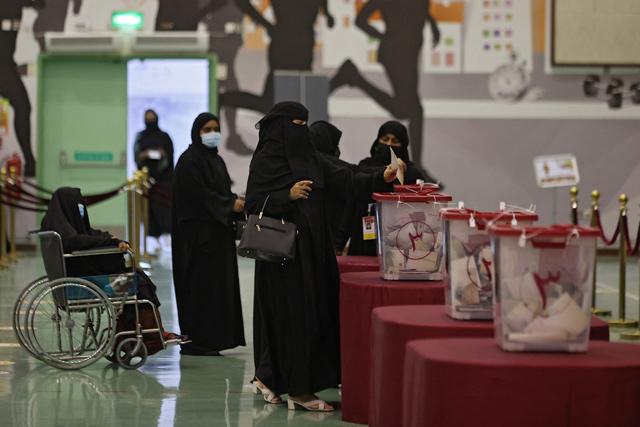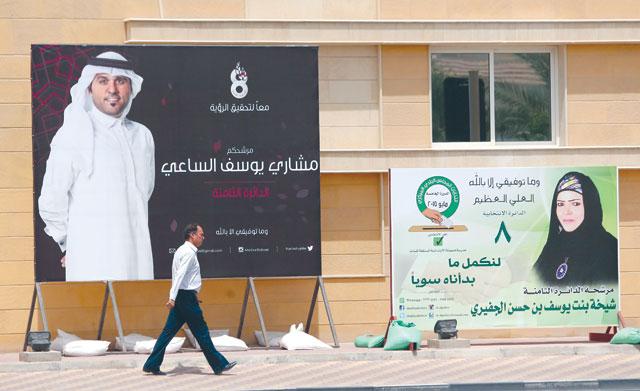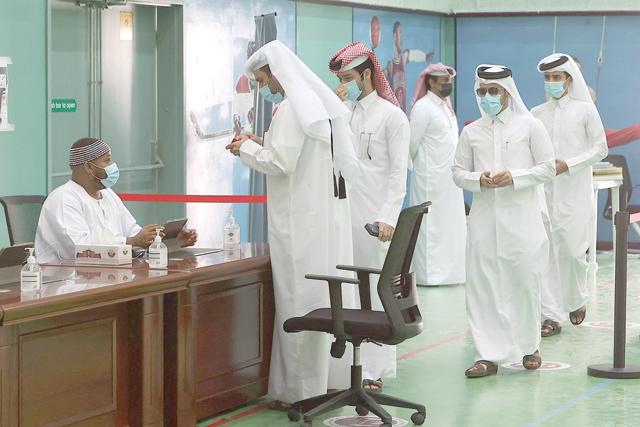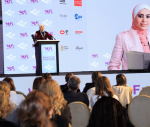You are here
Qataris vote in subdued first legislative election
By AFP - Oct 03,2021 - Last updated at Oct 03,2021

A Qatari woman casts her ballot at a polling station in the northern coastal city of Fuwayrit, about 50 kms north of the capital Doha, during the country's first ever legislative elections, on Saturday (AFP photo)
DOHA — Qataris were voting in the emirate's first legislative election on Saturday in a symbolic nod to democracy with eligible voters being only descendants of those who were citizens in 1930.
The vote is for 30 members of the 45-strong Shura Council, a body with limited powers that was previously appointed by the emir as an advisory chamber.
Polls opened at 05:00 GMT and will close at 15:00 GMT with the results expected the same day.
Some 101 candidates, more than one-third of the entire field, had dropped out of the race by Saturday afternoon according to state-run Qatar TV, apparently to support other candidates in their constituencies.
After the withdrawals, there were 183 candidates in contention for the 30 seats with the remaining 15 to be appointed by the emir.
Across the Arabian desert peninsula nation, orderly queues of Qataris in national dress formed inside polling stations, mostly schools and sports halls.
They cast their ballots into semi-transparent plastic boxes emblazoned with the dhow boat, crossed swords and palm tree emblem of Qatar.
Observers say the decision to hold the election, required under the 2004 constitution but repeatedly delayed in the "national interest", comes amid heightened scrutiny as Qatar prepares to host the 2022 World Cup.
"It's a way to show that they are moving in the right direction, that they want to achieve more political participation" before the World Cup, said Luciano Zaccara, an assistant professor in Gulf politics at Qatar University.
The Shura will be allowed to propose legislation, approve the budget and recall ministers. But the emir, all-powerful in the world's largest exporter of liquefied natural gas, will wield a veto.
“It’s a landmark, voting for the first time here — it’s incredible that I get to be part of it. When I was putting my tick, folding it and putting it in the box, I felt like I was part of something bigger,” said Doha voter Sheikha Ateeq Al Khulaifi, 25.
“I’m really excited to see where this goes.”
The streets of Qatar’s towns have been speckled with billboards adorned with beaming candidates sporting national dress.
Beyond single-candidate town hall meetings, posters and TV spots, the country’s electoral exercise has been limited, with no change of government possible and political parties outlawed.
Candidates have uniformly avoided debate about Qatar’s foreign policy or status as a monarchy, instead focussing on social issues including healthcare, education and citizenship rights.
‘Deliver our voice’
All candidates had to be approved by the powerful interior ministry against a host of criteria, including ancestry, age and character.
Candidates were also required to register official campaign events with the ministry in advance, as well as the names of all speakers as authorities seek to clamp down on possible sectarianism or tribalism.
Just one in ten of the originally confirmed candidates were women.
Most of Qatar’s 2.5 million residents are foreigners, ineligible to vote.
Candidates have to stand in electoral divisions linked to where their family or tribe was based in the 1930s, using data compiled by the then-British authorities.
In Al Khor, a fishing town north of Doha, voters flocked to the polls in one district which has 13 candidates, making it one of the most competitive races in the country.
“There are a large number of candidates... but for me the most important thing in the selection is competence,” said voter Rashid Abdul Latif Al Mohannadi, 37.
Diplomatic sources suggest families and tribes have already conducted internal ballots to determine who will be elected for their constituencies.
“When you don’t have political parties... people sometimes will tend to vote for people they know, or for members of family or members of tribe,” said Courtney Freer, a fellow at Emory College.
Qataris number about 333,000, but only descendants of those who were citizens in 1930 are eligible to vote and stand, disqualifying members of families naturalised since then.
Some members of the sizeable Al Murrah tribe are among those excluded from the electoral process, sparking a fierce debate online and isolated protests.
Related Articles
DOHA — Qatar's emir pledged "equal citizenship" on Tuesday after some people were excluded from participating in the country's first legisla
Qataris will have a rare chance to vote Wednesday as they choose candidates to sit on the country's only directly elected body, with calls growing to ensure more women are selected.
DOHA — Women voters voiced disappointment on Sunday after none were elected in Qatar's first legislative polls with all eyes on whether the


















